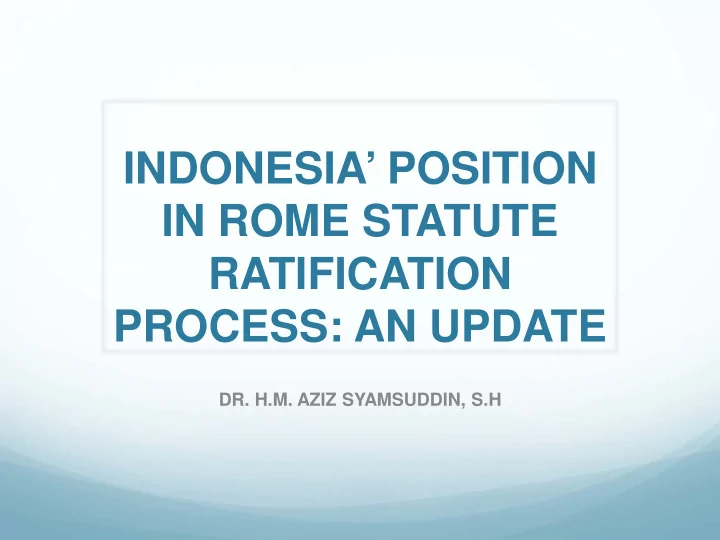

INDONESIA’ POSITION IN ROME STATUTE RATIFICATION PROCESS: AN UPDATE DR. H.M. AZIZ SYAMSUDDIN, S.H
HISTORY & PRELIMINARY A View that Indonesia should ratify Rome Statute 1998 to address law enforcement problems and human rights. Indonesia has expressed its commitment since 1999. However, many contras occurred to not to ratify as it may prevail sovereignty. Indonesia has begun to process its ratification since 2004 (RANHAM 2004-2009 and RANHAM 2011-2014). Indonesian Govt in 2008 formed the National Committee 2013, sending a special team (Ministry of Law and Human Rights) to Den Haag Parliament since then is long waiting for Govt to submit the bill of ratification (Constitution stipulates that ratification process must be submitted to Parliament by Govt)
Views on Rome Statute - Benefit Many Indonesian people feel that ICC Rome Statute is such an urgent need. However, the agenda of ratification is not yet included in the new President plan. Rome Statute will be able to punish the most responsible persons and to avoid impunity or amnesty to the “real culprit” jurisdiction given also to International Criminal Court altogether with Nationals. This Statute will also protect all the peacekeeping forces. By law, Govt or state responsibility is guaranteed. It will also address the gaps in national criminal law.
Views on Rome Statute- Benefit It strengthens the Witness and Victim Protection Programs. Indonesia will have such active Preference Rights to the Assembly and may also preserve the rights to be part of the ICC. National Law reform can be more effective and efficient. The Statute supports for “Technical Assistance” and build the capacity more for Law Enforcement Agencies. More on Human Rights Protections and Democracy. Better Diplomatic position for Indonesia.
Ratification Failure Effects Negative impressions on Human Rights Protection Commitment Impunity can be systematically and easily approached. National Interest may have diverged to uncommon interest Failure on underlining the court and law enforcement weaknesses.
Updating Indonesia Position Rome Statute should be of the understanding that it supports National Law rather that it intervenes the national jurisdiction. ICC will step in if there is a weakness in court jurisdiction to handle the matters. Many views that Indonesia is ready to ratify ICC, indeed ICC will give such precedent and experience. But the infrastructure of the law instrument and structure shall be ready beforehand.
Updating Indonesia Positions Indonesia Law Principle (Legality Principle) is in line with ICC Statute. non-retroactive principle, No Ne Bis in Idem , No Expiration on Human Rights Case. The ICC is also confirming Law on Human Rights, Human Rights Court, Witness and Victim Protection. Individual and Corporate Responsibility have been admitted as part of criminal and social responsibility. Indonesia now has begun to reform its Criminal Code and Criminal Procedure Law. The updating result that the draft on the Criminal Law recognises Genocide or Human Rights Crime
Updating Indonesia Positions In fact, Indonesia meets many barrier to proceed the ratification further. Minimum public understanding of ICC/ Rome Statute The process of Ratification must be well-considered by Govt and it takes Time before asking Parliament enactment. Debate on the term “unwilling” and “unable” principle which gives position of ICC complimentary on National Laws. understanding of ICC intervention. Officials may have lack of information and awareness on ICC Resistance of Defence Agency and National Army.
Conclusion Indonesia needs to obtain views and support to comprehend ICC or Rome Statute. Parliament as well as people may consistently require Govt to submit the ratification to Parliament (DPR RI). Must have wider public support. Require Assistance on Academic Draft and the Bill Development to ratification process. Initiate a wide academic supports. A Seminar/Workshop or any assistance to decrease Army or Defence Agency Resistance. Call of Awareness to upcoming agenda (ASEAN Economic Society) requires comprehensive law instruments.
THANK YOU
Recommend
More recommend